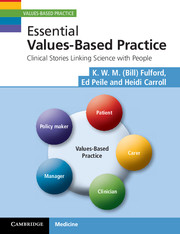Book contents
- Frontmatter
- Review quotes
- Contents
- Foreword
- Acknowledgements
- A bold claim to start this book
- Prologue: linking science with people
- Part 1 Values, individuals and an overview of values-based practice
- Part 2 The clinical skills for values-based practice
- 4 Recovery in schizophrenia: a values wake-up call
- 5 Teenage acne: widening our values horizons
- 6 A smoking enigma: getting (and not getting) the knowledge
- 7 Diabetic control and controllers: nothing without communication
- Part 3 Relationships in values-based practice
- Part 4 Science and values-based practice
- Part 5 Bringing it all together
- Postcript: the small change of care
- A bold claim to end this book
- Appendix A Values-based practice summary and definitions of key terms
- Appendix B Values-based practice teaching framework
- Index
4 - Recovery in schizophrenia: a values wake-up call
Published online by Cambridge University Press: 05 June 2012
- Frontmatter
- Review quotes
- Contents
- Foreword
- Acknowledgements
- A bold claim to start this book
- Prologue: linking science with people
- Part 1 Values, individuals and an overview of values-based practice
- Part 2 The clinical skills for values-based practice
- 4 Recovery in schizophrenia: a values wake-up call
- 5 Teenage acne: widening our values horizons
- 6 A smoking enigma: getting (and not getting) the knowledge
- 7 Diabetic control and controllers: nothing without communication
- Part 3 Relationships in values-based practice
- Part 4 Science and values-based practice
- Part 5 Bringing it all together
- Postcript: the small change of care
- A bold claim to end this book
- Appendix A Values-based practice summary and definitions of key terms
- Appendix B Values-based practice teaching framework
- Index
Summary
Topics covered in this chapter
The importance of raised awareness of values is illustrated by a story of recovery in schizophrenia.
Other topics include:
Crises and shared values
NICE guidelines
Person-centered and multidisciplinary assessment
Assessment of strengths (StAR values)
WRAP (Wellness Recovery Action Plan).
Take-away message for practice
In assessing a patient's problems, always think about their strengths, aspirations and resources (their StAR values), as well as their needs and difficulties.
The first process element of values-based practice is raised awareness of values, including one's own values, and raised awareness of the diversity of values. In this chapter, we explore the importance of this first element through the story of a young woman, Sally Coombs, following her admission to the acute care ward of her local psychiatric hospital.
We noted in Chapter 1 the importance for values-based practice of raising awareness of positive as well as negative values. It turns out that at the heart of Sally Coombs' story were positive and previously unrecognized aspects of her own values including a number of strengths, aspirations and resources. We call these StAR values. Raising awareness of these StAR values through an ongoing process of person-centered and multidisciplinary assessment is a crucial element of this story.
The clinical context
Sally Coombs, a 21-year-old art student, was brought to the acute admissions ward of her local psychiatric hospital by two police constables.
- Type
- Chapter
- Information
- Essential Values-Based PracticeClinical Stories Linking Science with People, pp. 39 - 52Publisher: Cambridge University PressPrint publication year: 2012
- 1
- Cited by

